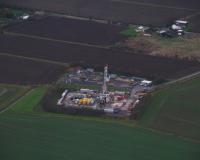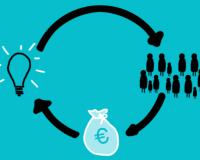
Vibrant Environment
Climate Change And Sustainability
All | Biodiversity | Climate Change and Sustainability | Environmental Justice | Governance and Rule of Law | Land Use and Natural Resources | Oceans and Coasts | Pollution Control

In a not-so-far-away future, environmental management will be done largely by algorithm. Here is how that could happen . . . .
In 2015, two graduates from Stanford business school, William Glass and Eden Kropski, founded a firm to produce and sell high-performance sportswear made entirely of synthetic fibers bioengineered from yeast microbes. The product was a runaway success and low-impact, but shipping it around the planet wasn’t.

The U.K. government cites shale gas as a “safe and environmentally sound” source of new energy and is actively promoting development of the fossil resource—using hydraulic fracturing and horizontal drilling—in hopes of emulating the United States’ shale gas “revolution.”

Tropical forest ecosystems are globally recognized for their carbon sequestration capacities. Past research has estimated that tropical forests on average sequester a net 1400 teragrams of carbon per year, the equivalent of taking approximately 1 billion passenger vehicles off the road. International governing bodies, national governments, and nonprofit organizations have attempted to capitalize on the carbon sequestration services provided by tropical forests in an increasingly carbon rich atmosphere. Programs such as REDD+ (Reducing Emissions from Deforestation and forest Degradation + enhancing forest carbon stocks) have resulted in significant expenditures of efforts and resources into developing frameworks for preserving tropical forests.

Last month, Trump Administration officials attended the latest round of U.N. climate negotiations in Bonn, Germany, but they weren’t there to discuss reducing emissions. Rather, they touted the promises of nuclear energy, natural gas, “clean coal,” and carbon capture. This is not surprising, given the President’s views on climate policy and his decision to withdraw the United States from the Paris Agreement. But even had Trump decided otherwise, the current Agreement does not do enough to reduce the risk of catastrophic climate change.

While EPA under Administrator Scott Pruitt seeks to drastically reduce the social cost of carbon (SCC), insurers already know that 2017 delivered the most expensive Atlantic hurricane season ever for insurance companies. Beyond this year, since the 1980s, the annual average losses to insurers have risen, increasing over the last decade from $10 billion to about $50 billion. “Insurers are rightfully worried that, in the long term, climate change could devastate their industry,” reported the Los Angeles Times. While Texas, Florida, and Puerto Rico flood, EPA recalculates, and insurance companies add up their costs.

September 22 marked the beginning of fall, and for some, that means it’s officially apple-picking season. Coincidentally, this isn’t the only type of apple officially in season. September 22 also marked the release date of Apple’s iPhone 8. And it’s not too long until you have your pick of a new Apple product with the release of the iPhone X on November 3.

In 2008, as many financial instruments dissolved stranding their investors in seas of debt and spasms of panic, a new instrument appeared at the intersection of the crowd and the web: crowdfunding.

On August 8, 2017, the D.C. Circuit held in Mexichem Fluor, Inc. v. EPA, No. 15-1328 (D.C. Cir. Aug. 8, 2017), that EPA overstepped its authority under the CAA when it banned the use of hydrofluorocarbons (HFCs) in products. HFCs were adopted as alternatives to ozone-depleting substances (ODSs) in the 1990s under the Montreal Protocol. Their adoption was encouraged through application of EPA's Significant New Alternatives Policy (SNAP) Program, which was created to help implement U.S.

Paris and Los Angeles are set to host the 2024 and 2028 Olympic Games, respectively. Hosting the games will offer these cities the chance to showcase not only their countries’ finest athletes, but also their technological innovation and cultural vibrancy. However, preparing for the Olympics also presents massive infrastructural, economic, and environmental challenges.

As reported previously in the Environmental Law Reporter's Weekly Update, several countries have expressed their desire to move away from vehicles powered by diesel and gas in recent months. Most recently, the British government committed to ban the sale of diesel and gas vehicles from 2040 to curb rising levels of nitrogen oxide.